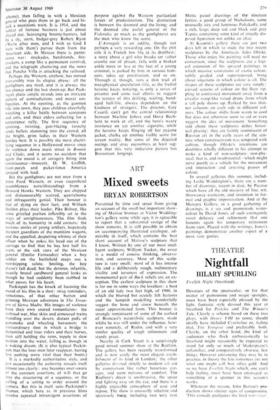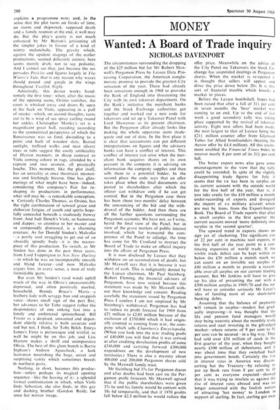THEATRE
Nightfall
HILARY SPURLING
Twelfth Night (Stratford) Devotees of the spectacular, or for that matter of pantomime and magic spangles, must have been especially pleased by the light, fantastic style devised this year at Stratford for Pericles and The Wittier's Tale. Clearly a scheme based on these two plays, with Henry VIII to come, should ideally have included Cymbeline or, failing that, The Tempest and preferably both. Clearly, on the other hand, the kind of audiences who flock enthusiastically to Stratford might reasonably be expected to stand for only so much of Shakespeare's unfamiliar, and comparatively abstruse, last things. However entrancing they may be in practice, in theory the late romances arc not what one might call box office gold. And so we have Twelfth Night which, one can't help feeling, must have been envisaged as something of a spanner in this season's works.
Whatever the reason, John Barton's pro- duction shows sinister signs of compromise. 'This comedy prefigures the final roen,...ee,*. explains a programme note; and, in the sense that the plot turns on freaks of time, on storm and shipwreck, supposed death and a family reunion at the end, it well may do. But the play's gaiety is not much enhanced by Mr Barton's jettisoning all the simpler jokes in favour of a kind of wintry melancholy. The gravity which, against the opulent stagings of the earlier productions, seemed delicately austere, here seems merely drab, not to say pedantic. And I cannot see that, just because the sea pervades Pericles and figures largely in The Winter's Tale, that is any reason why waves should pound and gurgle in the wings throughout Twelfth Night.
Admittedly, this device works hand- somely the first time: when, after the music of the opening scene, Orsino vanishes, the court is whisked away and doors fly open at the back on Viola, appearing in a puff of smoke—which, on second thoughts, turns out to be a wisp of sea spray curling round her ankles. Christopher Morley's set is a magnificent great hall, receding according to the symmetrical perspective of which the Renaissance was so fond, dwindling to a point and built of wooden slats. Barred sunlight, trellised walks and neat silvery trees in tubs suggest the costly artificiality of Illyrian manners, in sharp contrast to Viola coming ashore in rags, attended by a captain and two seamen, all piratically louche. This moment, like the plot itself, has an unreality at once theatrical, mysteri- ous and fetchingly bizarre. One has glim- merings of what might have been—indeed, considering this company's flair for re- shaping its productions in performance, what still may be—a remarkable conception. lc Certainly Charles Thomas, as Orsino, has the right combination of sensual grace and elaborate fatigue, of youth and spirits hope- fully concealed beneath a studiously frowsy front. And Judi Dench's Viola, so humorous and dapper, so attentive to her master and so composedly distressed, is a charming creature. As for Donald Sinden's Malvolio —a portly soul struggling to get out of an absurdly spindly body—it is the master- piece of this production. To switch, as Mr Sinden has done in the past three years, from Lord Foppington to Not Now Darling —in which he was an incomparably smooth and bland farceur—and now Malvolio argues him, in every sense, a man of truly formidable parts.
But even Mr Sinden's road winds uphill much of the way in Olivia's unaccountably depressed, and often positively morbid, household. Brenda Bruce's Maria—a leathery lady with scraggy bun and snappish voice—shows small sign of the pert flirt; her advances to Sir Toby suggest rather the despondency of one sinking fast into a lonely and embittered spinsterhood. Bill Fraser as a despised, unwanted and depen- dant elderly relative is both accurate and sad but not, I think, Sir Toby Belch. Emrys James's Feste is picturesque and wistful, as well he might be on this job, and Lisa Harrow makes a shrill and unimpressive Olivia. The best of this glum bunch is Barrie Ingham's Andrew Aguecheek, a lank Scotsman nourishing the huge, secret and surprising vanity which sometimes breeds in northern parts.
Nothing, in short, becomes this produc-
tion—unless perhaps its magical opening sequence—like the leaving of it : a splendid
formal confrontation in which, when Viola finds Sebastian, she also finds, in this gay and dashing brother (Gordon Reid), for once her mirror image.



































 Previous page
Previous page